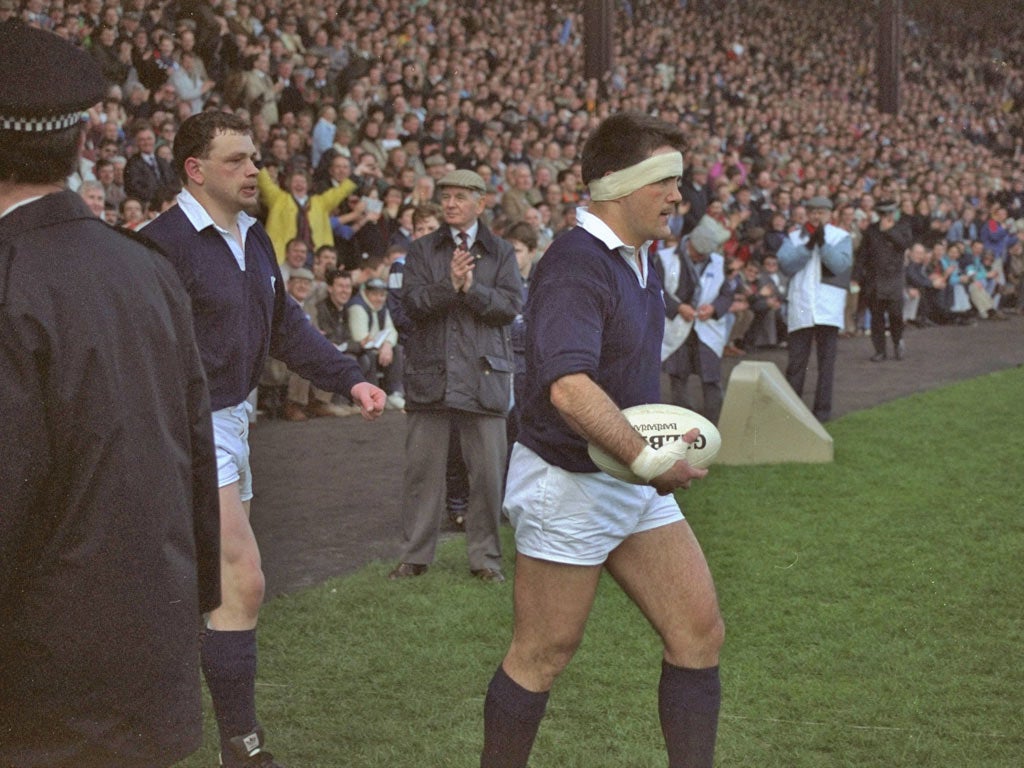How a slow walk sped the Scots to a 1966 moment
Sole's stroll, a hatred of Thatcher and a wall of sound made Murrayfield magical in 1990. Robin Scott-Elliot on England's nightmare

"It's about the sum of the parts," says Sean Lineen. "That's pretty much what it's always been in Scottish rugby." It is 21 years since Lineen stepped out of the Murrayfield tunnel into the chill of an early spring afternoon and into a wall of noise, a tartan tumult. The old stadium, from its banks of terracing at either end, the railway line north out of Edinburgh passing above one, to the stands looming over each touchline, all crammed to the limit, was ready to play its part. Already out on the field were Will Carling and his 14 England colleagues, huddled around their captain in bright white shirts having burst at speed out of the tunnel moments before.
David Sole, Carling's Scottish counterpart, led his team out of the dressing room and into the dark tunnel. Two days previously, Sole and his senior players, John Jeffrey, Finlay Calder and Gavin Hastings, decided they would walk out, rather than run, and when the crowd first caught sight of Sole, trademark white headband bound tight, eyes fixed straight ahead, a visceral roar spread around Murrayfield. "I remember thinking 'bloody hell' when I heard the noise," says Lineen. It struck Damian Cronin, the Bath-based lock, too. "Incredible, absolutely phenomenal," he says. "It gave a massive boost to the team's morale." The parts were adding up.
Lineen is still playing a leading role in Scottish rugby – his influence will be there tomorrow in Auckland where 16 of the Scotland squad have passed through the Glasgow ranks, the team he now coaches. They will be judged to the standards he helped to set that day in Edinburgh, Scotland's finest on a rugby field and, for some, on any sporting field. It was Scottish rugby's 1966 moment.
Their successors have always had to handle the baggage that brings. It was the perfect storm of coincidence, a rough blend of sport, politics, hype, stereotype, enmity and theatre – a unique set of conditions. Come matchday, the sound and fury took players from both sides by surprise. The Scotland management had deliberately shielded their charges from the media and the rapidly accelerating bandwagon; the English had no idea they had become cast as such villains in the Scottish play.
Last year, as the 20th anniversary of the 13-7 win was celebrated, Sole wrote to The Scotsman. "It was a game of rugby – the only difference was, there was a Grand Slam at stake. It is a shame the victory has been interpreted by some as something more than that, but if that is the belief they hold then that is their right, but to do so diminishes what the game represented for many."
Yet for plenty in Scotland, outside the close-knit group of players, it did represent, for one frantic and furious afternoon alone, something more than a rugby match. Brian Moore, the England hooker, knew it. "Half of England hated Thatcher," he said in Tom English's engrossing book on the game, The Grudge, "but most of Scotland despised her. I understood why we were hated. I got it. They hated her ... and we were English and so came along with that. We drove straight into something powerful."
Cronin's journey had begun the previous Tuesday. He signed off work for the week and headed north. "I was lucky with my work but others weren't," he says. "Kenny Milne [the hooker] was a baker and sometimes had to do his baking, then come to training. It was as unprofessional as it's professional now."
That evening he met up with the other forwards. Out on the practice pitches behind Murrayfield was an old scrummaging sled which they piled high with concrete blocks. "We did 100, 150 scrums – I actually felt sorry for the front row after that," Cronin recalls. "Training was intense, competitive. But it always was under Jim Telfer. He would whack you if you didn't get low enough, there would be a clip or a verbal tirade if you were lucky.
"Jim and Ian [McGeechan] tried to keep it as normal a week as possible. We were asked not to speak to the press and if anyone asked we were to say England had the better chance. The idea was to keep ourselves as the underdog, let England do the talking, we were better off being humble."
England, with Carling, Jeremy Guscott in his graceful prime and Tony Underwood flying on the wing, had cruised through the Five Nations, beaten Ireland 23-0, won 26-7 in Paris and crushed Wales 34-6. Scotland had found the going much tougher and it had taken a rare Cronin try to snatch victory in Wales two weeks previously and set up the Grand Slam decider.
"They had cruised through their games, while we had sneaked through ours," says Lineen. "But there was real belief inside the team that we would win." And that day in March 1990, Scottish self-belief made it so.
Join our commenting forum
Join thought-provoking conversations, follow other Independent readers and see their replies
Comments
Bookmark popover
Removed from bookmarks